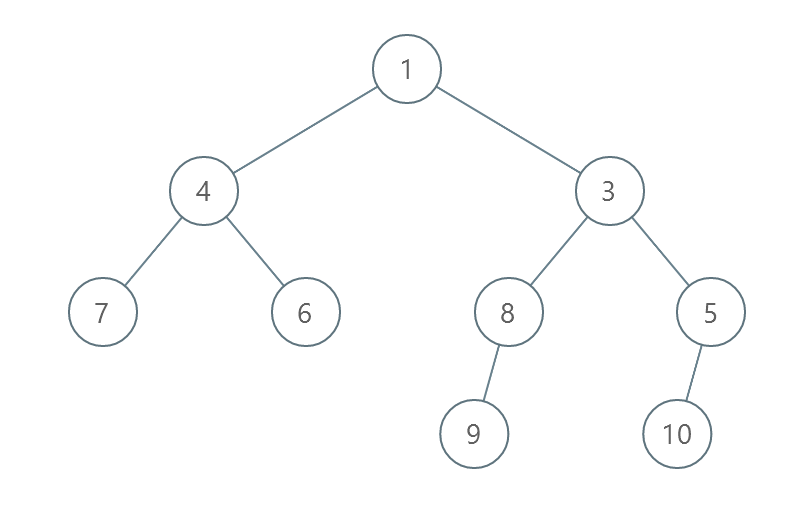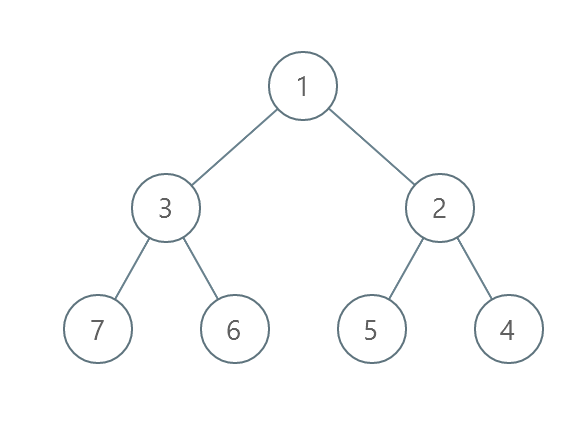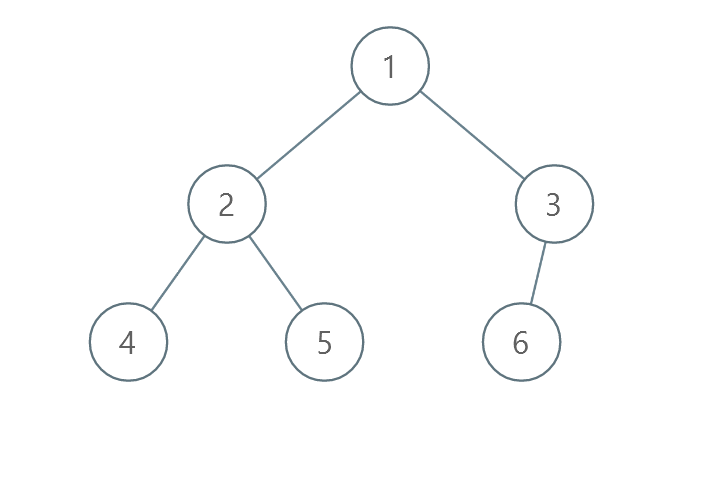二叉树
广度优先搜索
树
题目描述
给你一个 值互不相同 的二叉树的根节点 root 。
在一步操作中,你可以选择 同一层 上任意两个节点,交换这两个节点的值。
返回每一层按 严格递增顺序 排序所需的最少操作数目。
节点的 层数 是该节点和根节点之间的路径的边数。
示例 1 :
输入: root = [1,4,3,7,6,8,5,null,null,null,null,9,null,10]
输出: 3
解释:
- 交换 4 和 3 。第 2 层变为 [3,4] 。
- 交换 7 和 5 。第 3 层变为 [5,6,8,7] 。
- 交换 8 和 7 。第 3 层变为 [5,6,7,8] 。
共计用了 3 步操作,所以返回 3 。
可以证明 3 是需要的最少操作数目。
示例 2 :
输入: root = [1,3,2,7,6,5,4]
输出: 3
解释:
- 交换 3 和 2 。第 2 层变为 [2,3] 。
- 交换 7 和 4 。第 3 层变为 [4,6,5,7] 。
- 交换 6 和 5 。第 3 层变为 [4,5,6,7] 。
共计用了 3 步操作,所以返回 3 。
可以证明 3 是需要的最少操作数目。
示例 3 :
输入: root = [1,2,3,4,5,6]
输出: 0
解释: 每一层已经按递增顺序排序,所以返回 0 。
提示:
树中节点的数目在范围 [1, 105 ] 。
1 <= Node.val <= 105 树中的所有值 互不相同 。
解法
方法一:BFS + 离散化 + 元素交换
我们先通过 BFS 遍历二叉树,找到每一层的节点值,然后对每一层的节点值进行排序,如果排序后的节点值与原节点值不同,则说明需要交换元素,交换元素的次数即为该层需要的操作数。
时间复杂度 \(O(n \times \log n)\) 。其中 \(n\) 为二叉树的节点数。
Python3 Java C++ Go TypeScript Rust
1
2
3
4
5
6
7
8
9
10
11
12
13
14
15
16
17
18
19
20
21
22
23
24
25
26
27
28
29
30
31
32
33
34
35
36 # Definition for a binary tree node.
# class TreeNode:
# def __init__(self, val=0, left=None, right=None):
# self.val = val
# self.left = left
# self.right = right
class Solution :
def minimumOperations ( self , root : Optional [ TreeNode ]) -> int :
def swap ( arr , i , j ):
arr [ i ], arr [ j ] = arr [ j ], arr [ i ]
def f ( t ):
n = len ( t )
m = { v : i for i , v in enumerate ( sorted ( t ))}
for i in range ( n ):
t [ i ] = m [ t [ i ]]
ans = 0
for i in range ( n ):
while t [ i ] != i :
swap ( t , i , t [ i ])
ans += 1
return ans
q = deque ([ root ])
ans = 0
while q :
t = []
for _ in range ( len ( q )):
node = q . popleft ()
t . append ( node . val )
if node . left :
q . append ( node . left )
if node . right :
q . append ( node . right )
ans += f ( t )
return ans
1
2
3
4
5
6
7
8
9
10
11
12
13
14
15
16
17
18
19
20
21
22
23
24
25
26
27
28
29
30
31
32
33
34
35
36
37
38
39
40
41
42
43
44
45
46
47
48
49
50
51
52
53
54
55
56
57
58
59
60
61
62
63
64
65 /**
* Definition for a binary tree node.
* public class TreeNode {
* int val;
* TreeNode left;
* TreeNode right;
* TreeNode() {}
* TreeNode(int val) { this.val = val; }
* TreeNode(int val, TreeNode left, TreeNode right) {
* this.val = val;
* this.left = left;
* this.right = right;
* }
* }
*/
class Solution {
public int minimumOperations ( TreeNode root ) {
Deque < TreeNode > q = new ArrayDeque <> ();
q . offer ( root );
int ans = 0 ;
while ( ! q . isEmpty ()) {
List < Integer > t = new ArrayList <> ();
for ( int n = q . size (); n > 0 ; -- n ) {
TreeNode node = q . poll ();
t . add ( node . val );
if ( node . left != null ) {
q . offer ( node . left );
}
if ( node . right != null ) {
q . offer ( node . right );
}
}
ans += f ( t );
}
return ans ;
}
private int f ( List < Integer > t ) {
int n = t . size ();
List < Integer > alls = new ArrayList <> ( t );
alls . sort (( a , b ) -> a - b );
Map < Integer , Integer > m = new HashMap <> ();
for ( int i = 0 ; i < n ; ++ i ) {
m . put ( alls . get ( i ), i );
}
int [] arr = new int [ n ] ;
for ( int i = 0 ; i < n ; ++ i ) {
arr [ i ] = m . get ( t . get ( i ));
}
int ans = 0 ;
for ( int i = 0 ; i < n ; ++ i ) {
while ( arr [ i ] != i ) {
swap ( arr , i , arr [ i ] );
++ ans ;
}
}
return ans ;
}
private void swap ( int [] arr , int i , int j ) {
int t = arr [ i ] ;
arr [ i ] = arr [ j ] ;
arr [ j ] = t ;
}
}
1
2
3
4
5
6
7
8
9
10
11
12
13
14
15
16
17
18
19
20
21
22
23
24
25
26
27
28
29
30
31
32
33
34
35
36
37
38
39
40
41
42
43
44
45
46 /**
* Definition for a binary tree node.
* struct TreeNode {
* int val;
* TreeNode *left;
* TreeNode *right;
* TreeNode() : val(0), left(nullptr), right(nullptr) {}
* TreeNode(int x) : val(x), left(nullptr), right(nullptr) {}
* TreeNode(int x, TreeNode *left, TreeNode *right) : val(x), left(left), right(right) {}
* };
*/
class Solution {
public :
int minimumOperations ( TreeNode * root ) {
queue < TreeNode *> q {{ root }};
int ans = 0 ;
auto f = []( vector < int >& t ) {
int n = t . size ();
vector < int > alls ( t . begin (), t . end ());
sort ( alls . begin (), alls . end ());
unordered_map < int , int > m ;
int ans = 0 ;
for ( int i = 0 ; i < n ; ++ i ) m [ alls [ i ]] = i ;
for ( int i = 0 ; i < n ; ++ i ) t [ i ] = m [ t [ i ]];
for ( int i = 0 ; i < n ; ++ i ) {
while ( t [ i ] != i ) {
swap ( t [ i ], t [ t [ i ]]);
++ ans ;
}
}
return ans ;
};
while ( ! q . empty ()) {
vector < int > t ;
for ( int n = q . size (); n ; -- n ) {
auto node = q . front ();
q . pop ();
t . emplace_back ( node -> val );
if ( node -> left ) q . push ( node -> left );
if ( node -> right ) q . push ( node -> right );
}
ans += f ( t );
}
return ans ;
}
};
1
2
3
4
5
6
7
8
9
10
11
12
13
14
15
16
17
18
19
20
21
22
23
24
25
26
27
28
29
30
31
32
33
34
35
36
37
38
39
40
41
42
43
44
45
46
47
48
49
50 /**
* Definition for a binary tree node.
* type TreeNode struct {
* Val int
* Left *TreeNode
* Right *TreeNode
* }
*/
func minimumOperations ( root * TreeNode ) ( ans int ) {
f := func ( t [] int ) int {
var alls [] int
for _ , v := range t {
alls = append ( alls , v )
}
sort . Ints ( alls )
m := make ( map [ int ] int )
for i , v := range alls {
m [ v ] = i
}
for i := range t {
t [ i ] = m [ t [ i ]]
}
res := 0
for i := range t {
for t [ i ] != i {
t [ i ], t [ t [ i ]] = t [ t [ i ]], t [ i ]
res ++
}
}
return res
}
q := [] * TreeNode { root }
for len ( q ) > 0 {
t := [] int {}
for n := len ( q ); n > 0 ; n -- {
node := q [ 0 ]
q = q [ 1 :]
t = append ( t , node . Val )
if node . Left != nil {
q = append ( q , node . Left )
}
if node . Right != nil {
q = append ( q , node . Right )
}
}
ans += f ( t )
}
return
}
1
2
3
4
5
6
7
8
9
10
11
12
13
14
15
16
17
18
19
20
21
22
23
24
25
26
27
28
29
30
31
32
33
34
35
36
37
38
39
40
41 /**
* Definition for a binary tree node.
* class TreeNode {
* val: number
* left: TreeNode | null
* right: TreeNode | null
* constructor(val?: number, left?: TreeNode | null, right?: TreeNode | null) {
* this.val = (val===undefined ? 0 : val)
* this.left = (left===undefined ? null : left)
* this.right = (right===undefined ? null : right)
* }
* }
*/
function minimumOperations ( root : TreeNode | null ) : number {
const queue = [ root ];
let ans = 0 ;
while ( queue . length !== 0 ) {
const n = queue . length ;
const row : number [] = [];
for ( let i = 0 ; i < n ; i ++ ) {
const { val , left , right } = queue . shift ();
row . push ( val );
left && queue . push ( left );
right && queue . push ( right );
}
for ( let i = 0 ; i < n - 1 ; i ++ ) {
let minIdx = i ;
for ( let j = i + 1 ; j < n ; j ++ ) {
if ( row [ j ] < row [ minIdx ]) {
minIdx = j ;
}
}
if ( i !== minIdx ) {
[ row [ i ], row [ minIdx ]] = [ row [ minIdx ], row [ i ]];
ans ++ ;
}
}
}
return ans ;
}
1
2
3
4
5
6
7
8
9
10
11
12
13
14
15
16
17
18
19
20
21
22
23
24
25
26
27
28
29
30
31
32
33
34
35
36
37
38
39
40
41
42
43
44
45
46
47
48
49
50
51
52
53
54
55
56 // Definition for a binary tree node.
// #[derive(Debug, PartialEq, Eq)]
// pub struct TreeNode {
// pub val: i32,
// pub left: Option<Rc<RefCell<TreeNode>>>,
// pub right: Option<Rc<RefCell<TreeNode>>>,
// }
//
// impl TreeNode {
// #[inline]
// pub fn new(val: i32) -> Self {
// TreeNode {
// val,
// left: None,
// right: None
// }
// }
// }
use std :: cell :: RefCell ;
use std :: collections :: VecDeque ;
use std :: rc :: Rc ;
impl Solution {
pub fn minimum_operations ( root : Option < Rc < RefCell < TreeNode >>> ) -> i32 {
let mut queue = VecDeque :: new ();
queue . push_back ( root );
let mut ans = 0 ;
while ! queue . is_empty () {
let n = queue . len ();
let mut row = Vec :: new ();
for _ in 0 .. n {
let mut node = queue . pop_front (). unwrap ();
let mut node = node . as_mut (). unwrap (). borrow_mut ();
row . push ( node . val );
if node . left . is_some () {
queue . push_back ( node . left . take ());
}
if node . right . is_some () {
queue . push_back ( node . right . take ());
}
}
for i in 0 .. n - 1 {
let mut min_idx = i ;
for j in i + 1 .. n {
if row [ j ] < row [ min_idx ] {
min_idx = j ;
}
}
if i != min_idx {
row . swap ( i , min_idx );
ans += 1 ;
}
}
}
ans
}
}
GitHub





